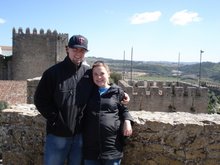Saturday, March 10, 2007
Like water and oil? Or more like delicious cookies?
I am pretty open about being a free-will theist and my utter confusion with the basic tenets of Calvinisim, but I was thinking the other day after a conversation with my wife. She works at a pretty conservative Christian school and had a conversation with the co-workers about politics. The best quote of the time was, "Barak Obama stands for everything evil in the world" (anyway, that's a discussion for a different blog). One of them mentioned how America is the best place anyone could live in the world because of all the amazing freedoms we have been given and often take for granted. Erica and I were talking about this and I was thinking through how my own theological beliefs often fit so nicely within the framework of my national identity. Not that I equate Christianity with my nationality, but that my focus on human freedom within my theology can be seen as an appropriation of an American ideal in conjunction with a Christian ideal. So, I still believe that the Bible emphasizes human freedom to a large extent, but I think it can be dangerous when we do not question the way our political landscape has corrupted or hijacked the faith. Any places you all have been hijacked?
Subscribe to:
Post Comments (Atom)


3 comments:
Morrow,
I think this is a mature observation. I've wondered the same thing from time to time. Erik Leafblad wrote this in response to me because I asked him where he was on human freedom these days. The discussion was about atonment and this is a caveat, but it has me thinking.
"That Christ has saved us is an objective fact (soteriology). We are called in the Spirit to bear witness to this (ecclesiology). I think you're right that it comes down to a freedom thing; I guess I'm defining freedom as obedience (that is, theologically) and not as power to the contrary (that is, philosophically). That we have the latter, I do not doubt. That the former is proper freedom, I think is correct."
Lund always used to point out to me Romans 6:18. I can't discount this verse. However, as I've grown in my understanding of the biblical picture of human freedom, I don't see it as antithetical to Arminianism or free will theism, especially in light of Roger Olson's clarifying work on classical Arminianism. Yet I do think that it may be antithetical to the notion of hyper autonomy bore in this country by the enlightenment.
Free to do what? Love God and lover others I think. This we couldn't have done without God's radical grace.
cheers my friend
Yeah. For the post in general, I agree that it is excellent to ponder such things and be cautious. However, we must also be encouraged by the couple thousand years of (parts of the) church tradition that either pre-date or are outside the realm of American values that also uphold free will theism. I think carn-o makes a great point in our hyper-autonomy not being a part of free will perhaps. Also in support of you is the freedom to love God and love others...or not to do so and end up with the world in which we currently live.
As for your question, I have wondered how much my sympathy for post-modern philosophy is culturally conditioned. This is where hyper-autonomy comes in. I tend to lean (not dive, just lean) in directions that recognize Cartesian Doubt and move further from our ability to make objective truth-claims. I always maintain that there is objective truth, but our approach and understanding of that truth is subjective. Anyway, I'm sure that the residue of the "I'm Okay, You're Okay" movement in the 70's probably shapes and informs my conclusions in this area. At the same time, I don't think this makes what I think completely useless or wrong. I guess we always have to be balanced...but not with Calvinism. I mean balanced with everything else. Good work.
I have thought about this topic a lot recently. I was having a theological conversation with a friend who pointed out that many of the books, both historical and current, that I was citing, quoting, or deriving ideas from have not been translated into many other languages besides English. I hadn't really thought about that aspect of understanding theology or creating a framework for understanding the world. In America we have access to ideas and resources that most of the world may never have access to. In this light it seems obvious that our life circumstances, whether nationally, socially, or economically would greatly impact how we view the world.
Sorry, I took it one step further than just nationalism.
To be clear, I am not saying that we should discount all that we have at our disposal, we should however, remember that our resources drastically impact how we think and perceive information. Try being premillennial and telling a father from West Africa that although his wife has been murdered and his son has been taken into a rebel army that we are not currently in a time of tribulation.
Ok, I could go on for a long time, so I should stop. Oh, let me know when that Calvinist discussion comes back around :)
Adam
Post a Comment